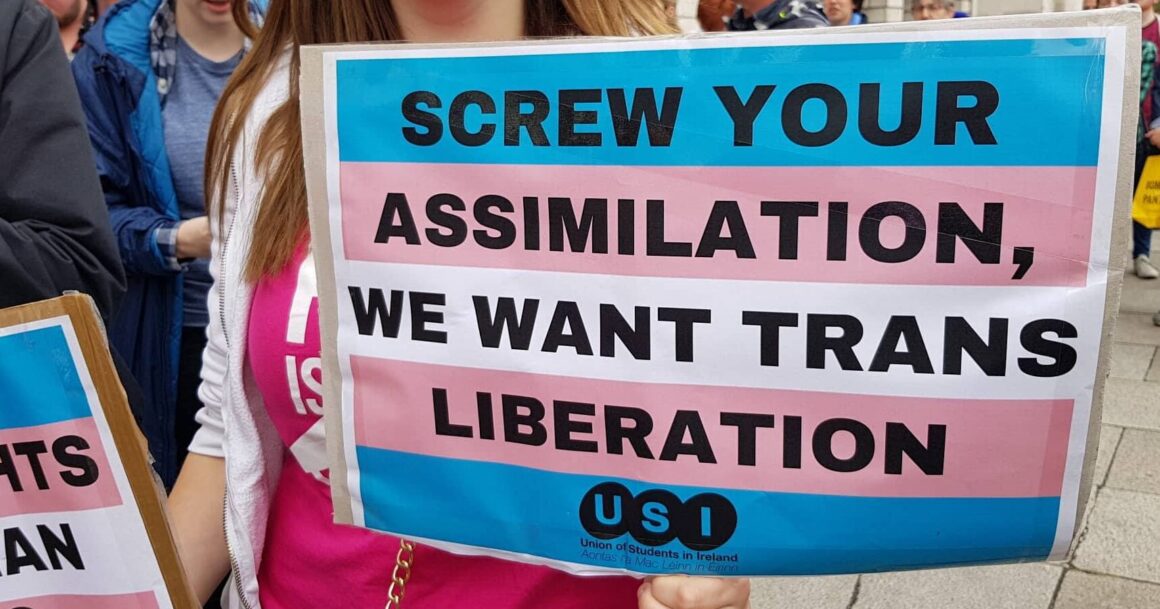

By Bernie McAdam
Last August the Stormont Executive leaders, both Sinn Fein and the Democratic Unionist Party (DUP), approved a temporary ban on puberty blockers for transgender youth. This recommendation emanated from the Cass Review which was commissioned by the UK government. The then Tory government had used emergency legislation to implement the ban earlier in the year.
Unlike most of Stormont’s politicians, People before Profit MLA, Gerry Carroll in opposing the ban said, ‘the Health Minister is attacking trans people to distract from the crisis in the health service,’ adding that puberty blockers are safely in use around the world but they are ‘lashing out at an oppressed minority to distract from their own failures’.
Pride groups throughout the six counties have now banned all the executive parties from their marches. Sinn Fein have come in for special criticism as they once claimed to stand against transgender oppression. It seems a far cry from Sinn Fein’s Gender Recognition (Amendment) Bill 2017 which stood for ‘a right to self-determination for persons who had reached the age of 16 years, ensuring access to a Gender Recognition Certificate for 16 and 17 year olds on the same terms as currently apply to persons who are 18 years old or older’.
Rolling the clock forward to the recent UK Supreme Court ruling on the Equality Act 2010 and Sinn Fein’s mettle is being tested once again. The ruling decided that the concept of sex is binary and only those defined as biologically female are women, thereby excluding trans people of both genders as well as intersex and non-binary people from using single sex spaces they had used for years.
In the Republic, meanwhile, Sinn Fein health spokesperson David Cullinane’s immediate response was to call for the UK ruling to be fully examined because ‘it was a commonsense judgement’. But the next day he was forced to apologise for any hurt or offence to the trans community.
Trans and Intersex Pride organisers in Dublin condemned these initial remarks and sought further clarity from Sinn Fein. Discussions ensued, with the group confirming that they were ‘not satisfied with the clarity received’. They have banned Sinn Fein from the Dublin Trans and Intersex march this July. Unsurprisingly there are media reports of long-standing members of Sinn Fein resigning over their party’s shifting positions on trans rights.
Back in the north of Ireland, where the Equality Act 2010 does not apply, the bigots of the DUP and TUV have lost no time in clamouring for Stormont to abide by the Supreme Court ruling. DUP Education Minister Paul Givan has instructed his officials to ensure that all schools comply with the ruling. Sinn Fein’s First Minister Michelle O’Neil could only feebly comment that it was ‘unfortunate’ that Givan’s move came ahead of guidance from the Equality Commission.
This is a cop out from Sinn Fein, passing the buck to the Equality Commission’s forthcoming report, and refusing to clarify their stance. The Equality Commission of Northern Ireland has already said that the judgement ‘is likely to be deemed highly persuasive by our industrial tribunals and courts and, consequently, it is likely to be followed in cases where similar issues arise’. So come on Michelle, are you in favour of the judgement or not? As if the Six Counties hasn’t seen enough of unjust British lawmaking!
Not that there aren’t problems for transgender people in the Republic of Ireland. Since 2015 anyone over 18 can apply to have their gender changed. If you are 16 or 17 you may also apply, but the process involves a court order with parental consent and will take much longer. Trans healthcare is among the worst in Europe, with 10 year long waiting lists quite common. It is based on assessments which are notoriously intrusive of their personal lives, and which rely on doctors’ own preconceptions of what constitutes transgender.
The struggle to defend trans rights is cross-border and also part of the fight against a rising tide of reaction internationally. As right wing populism seeks to turn back the clock on the rights of oppressed groups, we should demand the labour movement backs the resistance. The struggle against capitalism is not just an economic one but a political struggle that defends the democratic rights of all oppressed groups.